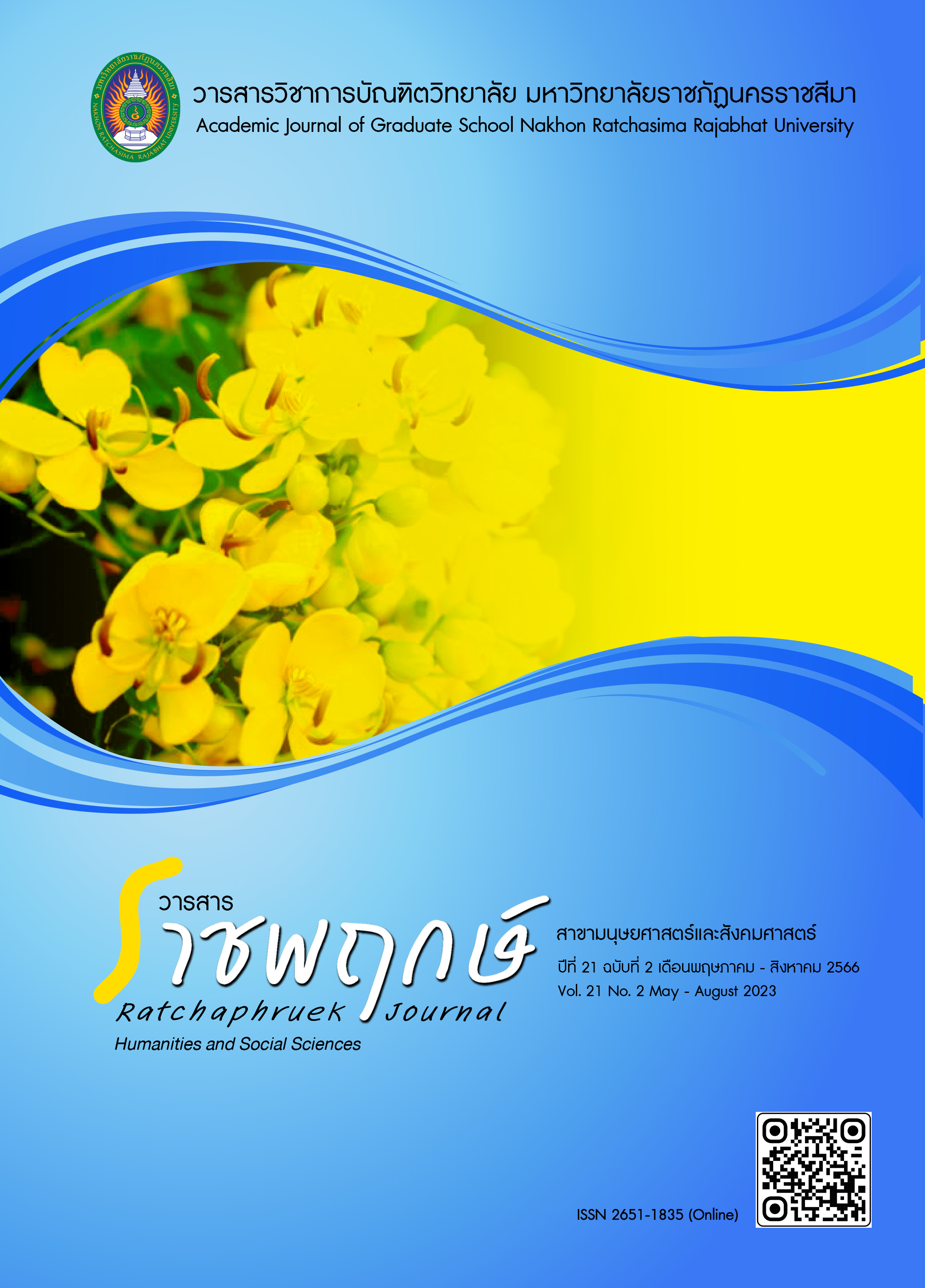Guidelines for Enhancing Teachers’ Professional Capital to Develop Higher Order Thinking Competency of Learners According to a Competency-Based Curriculum in Secondary Schools under Ratchaburi Cluster 1
Main Article Content
Abstract
The objectives of this research were to: 1) Study the current and desirable states and assess the need for enhancing teachers' professional capital to develop higher order thinking competency of learners according to a competency-based curriculum in secondary schools under Ratchaburi cluster 1 using the current and desirable state questionnaire with 181 teachers who were selected by multi-stage sampling; 2) Analyze the causes of the needs through interviews with ten key informants who are school administrators and teachers, which then were analyzed by an empathy map; and 3) Synthesize guidelines for enhancing teachers' professional capital from a content analysis of interview results with ten school administrators and teachers, together with results from steps one and two above.
The results showed that: 1) The highest need was found at the human capital (PNImodified = 0.145). 2) The needs were caused by the fact that teachers' learning management method did not promote learners' higher order thinking competencies, lack of awareness of the importance of higher thinking competencies, and lack of linking knowledge to real-life situations. 3) As the guidelines, the administrators, the peer teachers, and the educational supervisors should supervise, follow up, and give advices to teachers regarding learning management that promote learners’ higher order thinking competencies.
Article Details

This work is licensed under a Creative Commons Attribution-NonCommercial-NoDerivatives 4.0 International License.
References
กระทรวงศึกษาธิการ. (2565). ประกาศกระทรวงศึกษาธิการ เรื่อง นโยบายและจุดเน้นของ กระทรวงศึกษาธิการ ประจำปีงบประมาณ พ.ศ. 2566. สืบค้นเมื่อ 10 พฤษภาคม 2566, จาก https://www.moe.go.th/360policy-and-focus-moe-2023/
โชติกา ใจทิพย์ และกฤษดา เชียรวัฒนสุข. (2561). ศักยภาพของผู้นำองค์กรธุรกิจในสถานการณ์โลกที่มีความผันผวน ความไม่แน่นอน ความซับซ้อน และความคลุมเครือ. วารสารการจัดการธุรกิจ มหาวิทยาลัยบูรพา, 7(1), น. 1-14.
ปรียาภรณ์ ตั้งคุณานันต์. (2561). ความเป็นครูมืออาชีพ. กรุงเทพฯ: มีน เซอร์วิส ซัพพลาย.
ไพฑูรย์ สินลารัตน์ และนักรบ หมี้แสน. (2560). ครุศึกษาและการพัฒนาวิชาชีพครู. กรุงเทพฯ: จุฬาลงกรณ์มหาวิทยาลัย.
มานิตย์ อาษานอก. (2561). การบูรณาการกระบวนการคิดเชิงออกแบบเพื่อพัฒนานวัตกรรมการจัดการเรียนรู้. วารสารเทคโนโลยีและสื่อสารการศึกษา, 1(1), น. 6-12.
สำนักงานเขตพื้นที่การศึกษามัธยมศึกษาราชบุรี. (2566). แผนพัฒนาการศึกษาขั้นพื้นฐาน (พ.ศ. 2566-2570). สืบค้นเมื่อ 28 มีนาคม 2566, จาก https://drive.google.com/file/d/1e4OoncN5NHr1Eek16LbW_tutw6Y91g_9/view
สำนักงานคณะกรรมการการศึกษาขั้นพื้นฐาน. (2564). พฤติกรรมบ่งชี้หลักตามระดับสมรรถนะการคิดขั้นสูง. สืบค้นเมื่อ 10 พฤษภาคม 2566, จาก https://cbethailand.com/หลักสูตร/หลักสูตรฐานสมรรถนะ/สมรรถนะหลัก-5-ประการ/สมรรถนะการคิดขั้นสูง/พฤติกรรมบ่งชี้พฤติกรรม/
สำนักงานคณะกรรมการข้าราชการครูและบุคลากรทางการศึกษา. (2564). คู่มือการดำเนินการตามหลักเกณฑ์และวิธีการประเมินตำแหน่งและวิทยาฐานะข้าราชการครูและบุคลากรทางการศึกษา ตำแหน่งครู. สืบค้นเมื่อ 5 เมษายน 2566, จาก https://otepc.go.th/ images/00YEAR 2564/03_PV1/1Mv9-2564.pdf
สำนักงานศึกษาธิการจังหวัดราชบุรี. (2563). แผนพัฒนาการศึกษาจังหวัดราชบุรี พ.ศ. 2562-2565 ฉบับทบทวน ปี พ.ศ. 2563. สืบค้นเมื่อ 28 มีนาคม 2566, จาก http://plan.mcru. ac.th/ Work/Manual/PSH/62-65-SP.pdf
สุวิมล ว่องวาณิช. (2558). การวิจัยประเมินความต้องการจำเป็น (พิมพ์ครั้งที่ 3). กรุงเทพฯ: จุฬาลงกรณ์มหาวิทยาลัย.
อังคณา อ่อนธานี. (2564). การพัฒนาสมรรถนะการจัดการเรียนรู้ของครูเพื่อส่งเสริมการคิดขั้นสูงสำหรับผู้เรียนชั้นมัธยมศึกษา. วารสารศึกษาศาสตร์ มหาวิทยาลัยนเรศวร, 23(4), น. 406-418.
Bennett, N. & Lemoine, G. J. (2014). What a difference a word makes: Understanding threats to performance in a VUCA world. Business Horizons, 57(3), pp. 311-317.
Cronbach, L. J. (1951). Coefficient alpha and the internal structure of tests. Psychometrika, 16(3), pp. 297-334.
Hargreaves, A. & Fullan, M. (2012). Professional capital: Transforming teaching in every school. New York: Teachers College Press.
Krejcie, R. V. & Morgan, D. W. (1970). Determining Sample Size for Research Activities. Educational and Psychological Measurement, 30(3), pp. 607-610.
Likert, S. (1961). New patterns of management. New York: McGraw-Hill.
Miedijensky, S., Sasson, I. & Yehuda, I. (2021). Teachers’ Learning Communities for Developing High Order Thinking Skills-A Case Study of a School Pedagogical Change. Interchange, 52(1), pp. 577-598.


